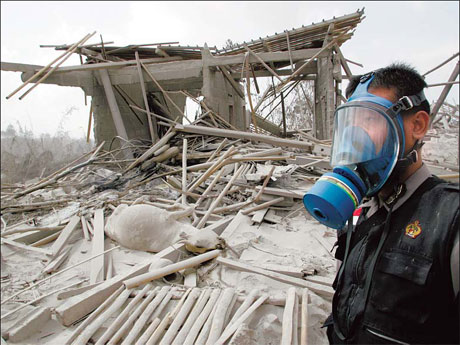Asia-Pacific
Tsunami kills 282; no Chinese casualties
By Cheng Guangjin and Xin Dingding (China Daily)
Updated: 2010-10-28 08:32
 |
Large Medium Small |
BEIJING - All Chinese nationals in Indonesia have been reported safe in the wake of a tsunami triggered by a strong earthquake in the archipelago, as the death toll has climbed to 282 on Wednesday, authorities said.
An official with the National Tourism Administration told China Daily he has received no reports of Chinese tourists stranded or hurt in Indonesia.
|
 Death from the sky A rescuer stands amid the ruins of a village smothered by ash from Tuesday's eruption of Mount Merapi in Yogyakarta, Indonesia, on Wednesday. The volcanic eruption and a tsunami on Monday killed at least 300 people, and 411 are still missing. See story on page 11. [Photo by Trisnadi / Associated Press] |
Dai Beibei with the marketing department at the China CYTS Tours Holding Co Ltd, said her company currently has two groups with more than 30 tourists on the island of Bali - the destination most frequently patronized by foreigners, and one which is far away from the disaster-stricken area.
"Their schedules will go on as planned. They will return to China in two or three days", she said, adding that so far no customer has cancelled a tour, and that other tour groups are also preparing to visit the island.
Operators with China Southern Airlines Co Ltd and Cathay Pacific Airways - the main airlines serving Indonesia-bound Chinese - have confirmed their flights to Jakarta are running as normal.
In a phone interview with China Daily on Wednesday afternoon, the press officer with the Chinese embassy in Indonesia, Wang Yan, said that no Chinese citizens have been reported dead or injured in the disaster-hit area.
Some Chinese companies and staff are in the regions near the disaster area, but their employees have already been relocated to safe places, according to Wang.
China's Red Cross, meanwhile, has offered $30,000 to Indonesia's Red Cross, which will be received on Thursday, said Wang.
Ade Edward, a disaster relief official of Indonesia, announced an increase in the estimated number of casualties up to 282 and 411 missing on Wednesday.
The 7.7 magnitude quake that struck late on Monday near the Mentawai Islands off Sumatra triggered the tsunami.
Analysts questioned the efficiency of Indonesia's warning system for earthquakes and tsunamis that frequent the island nation.
In 2005, China and the Association of Southeast Asian Nations (ASEAN) signed an action plan to establish a technological platform for an earthquake and tsunami early warning system, aiming to learn from the hard lessons of the 2004 Indonesia earthquake and tsunami that killed some 230,000 people in a dozen countries.
However, due to the nature of cooperation between the ASEAN nations, the agreement has not been effectively implemented, according to Luo Yongkun, a Southeast Asia analyst with the China Institutes of Contemporary International Relations.
"The so-called ASEAN way means that ASEAN nations do not enforce the implementation of agreements signed among the members - but it depends on the member nations' free will, which results in ineffective regional cooperation," said Luo.
A senior engineer with China's State Oceanic Forecasting Center, who spoke on the condition of anonymity, told China Daily that monitoring results show the latest Indonesian earthquake is not nearly as widespread and devastating as the one in 2004.
"Buoys deployed in the South China Sea didn't pick up any signals," the engineer said.
"It is impossible to predict an earthquake, what scientists can do is to monitor its signals," he added.
Indonesian President Susilo Bambang Yudhoyono cut short a state visit to Vietnam to travel to the site.
Several hundred kilometers away, another 28 people died on Java after the Mount Merapi volcano erupted.
Zhang Jing, Wang Di and agencies contributed to this story.



